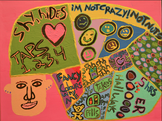408.823.4671
2 Comments
Steven Hall
10/6/2014 11:34:44 am
Reply
Steve Hall
10/6/2014 11:40:31 am
I so appreciate these posts Rochelle, please keep them coming!
Reply
Leave a Reply. |
AuthorRochelle is a licensed Marriage and Family Counselor, mindfulness instructor, and personal consultant. She hopes this blog will help shed light on some of the ideas that inspire her in her work with people. Archives
August 2015
Categories |

 RSS Feed
RSS Feed
